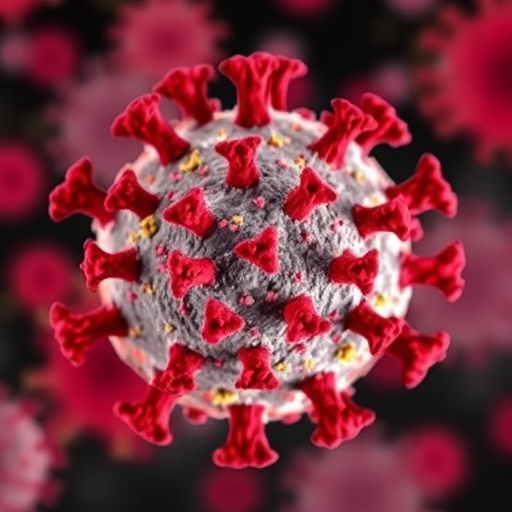In the ongoing battle against Covid-19, new research highlights the critical, yet often underestimated, impact of the virus on the cardiovascular system. Experts from the University of East Anglia, in collaboration with leading European heart associations, have issued a comprehensive clinical consensus statement, underscoring the necessity of continuing global Covid vaccination efforts to mitigate the heightened cardiac risks associated with both acute Covid infection and its persistent aftermath, known as long Covid. This groundbreaking work synthesizes existing scientific data, advocating for innovative approaches to diagnosis, treatment, and prevention of profound cardiovascular complications linked to the virus.
The depth and breadth of cardiovascular sequelae following Covid-19 infection have emerged as a pressing concern in clinical medicine. It is now evident that the SARS-CoV-2 virus exerts deleterious effects beyond the respiratory system, triggering inflammatory cascades and endothelial dysfunction that compromise heart and vascular tissue integrity. Consequently, patients recovering from Covid-19, particularly those who required hospitalization, demonstrate a significantly elevated risk for acute myocardial infarction, stroke, arrhythmias, and increased mortality related to cardiovascular disease. This risk extends far beyond the initial infection period, with many individuals experiencing symptoms for months or even years.
Long Covid, characterized by a constellation of persistent symptoms, presents unique challenges to cardiovascular health. Approximately five percent of the estimated 100 million global long Covid sufferers exhibit cardiac manifestations, including angina, palpitations, dyspnea, and fatigue. Underlying these symptoms is often autonomic dysfunction, wherein the nervous system’s regulation of heart rate, blood pressure, and respiratory function becomes impaired, compounding the difficulty of clinical management. The consensus document stresses the urgent need for heightened awareness among healthcare providers to recognize and appropriately address cardiac long Covid.
Central to the report’s recommendations is the unwavering emphasis on vaccination. Epidemiological data reveal that individuals who complete the full Covid-19 vaccine series experience substantially reduced rates of cardiac complications and long Covid symptoms, even when breakthrough infections occur. This protective effect is hypothesized to arise from vaccine-mediated attenuation of viral replication and systemic inflammation, thereby safeguarding the cardiovascular system from acute and chronic damage.
The report vividly describes the mechanisms through which Covid-19 may induce cardiovascular pathology. Viral entry into endothelial cells triggers widespread endothelialitis, promoting thrombosis and microvascular injury. Additionally, systemic hyperinflammation, often termed a cytokine storm, leads to myocardial injury, fibrosis, and impaired cardiac function. These pathophysiological insights form the basis for recommending timely and structured cardiac evaluations for patients recovering from Covid-19, particularly those presenting with persistent respiratory or cardiac symptoms.
Beyond prevention, the research advocates for the integration of structured cardiac rehabilitation programs tailored for Covid-19 survivors. Such multidisciplinary rehabilitation encompasses specialized physiotherapy aimed at restoring functional capacity, improving autonomic balance, and alleviating symptoms like breathlessness and fatigue. Cardiac rehabilitation has long been validated in the post-myocardial infarction patient population; its adaptation for long Covid may be instrumental in reducing morbidity and enhancing quality of life in this emerging patient cohort.
A pivotal challenge identified is the current inadequacy of cardiac rehabilitation services in many European regions, with capacity strained by both traditional cardiac patients and the influx of those affected by cardiac long Covid. The consensus calls for targeted investment and resource allocation to expand these programs, emphasizing equitable access, especially in underserved rural locations where healthcare disparities are pronounced. Without such strategic intervention, patients may face prolonged suffering and suboptimal recovery outcomes.
The research group behind this statement undertook a rigorous systematic review of the existing literature on Covid-19 and cardiovascular disease, meticulously analyzing studies on acute infection, vaccination impact, and long Covid syndromes. Their holistic approach yielded evidence-based guidelines encompassing screening protocols, therapeutic interventions, and preventive strategies, all designed to be dynamically updated as novel data emerge. This living document signals an evolving understanding of Covid’s cardiac dimension, encouraging ongoing clinical vigilance and research.
Profoundly pragmatic, the consensus statement aligns with a broader public health imperative: to anticipate and manage the long-term burden of Covid-19 on healthcare systems and populations. The authors advocate bolstering primary prevention efforts, including vaccination campaigns and lifestyle modifications that reduce cardiovascular risk factors. Simultaneously, they underscore the need for sustained clinical research focused on elucidating the mechanistic pathways of viral cardiac injury and evaluating novel therapeutics.
Importantly, the document recognizes the multifactorial nature of cardiac long Covid, urging healthcare providers to adopt a patient-centered approach that balances symptomatic relief, functional rehabilitation, and psychological support. Clinicians are advised to consider differential diagnoses vigilantly, as cardiac symptoms may overlap with pulmonary, neurological, or systemic sequelae. Advanced cardiovascular imaging and biomarker assays are recommended tools to refine diagnosis and tailor individualized care plans.
In conclusion, the University of East Anglia-led expert panel delivers a clarion call for maintaining robust vaccination programs and establishing comprehensive cardiac rehabilitation infrastructures worldwide. Their clinical consensus statement, published in the European Journal of Preventive Cardiology, is a milestone consolidating current knowledge while charting a course for future cardiovascular care in a post-pandemic world. As the global community adapts to the enduring challenges of Covid-19, this research underscores an urgent truth: safeguarding heart health is integral to conquering the pandemic’s legacy.
Subject of Research: People
Article Title: Cardiovascular Disease Prevention and Management in COVID-19. A Clinical Consensus Statement of the European Association of Preventive Cardiology, the European Association of Cardiovascular Imaging, the Association of Cardiovascular Nursing & Allied Professions, the European Association of Percutaneous Cardiovascular Interventions, and the Heart Failure Association of the ESC
News Publication Date: 18-Sep-2025
Keywords: COVID 19, Long Covid, Cardiovascular disorders, Vascular diseases, Viral infections, Vaccination, Preventive medicine, Human health, Public health, Rehabilitation centers
Tags: acute myocardial infarction and COVID-19cardiac complications from COVID-19clinical consensus on COVID-19 effectsCOVID-19 cardiovascular impactendothelial dysfunction and COVID-19inflammatory responses to COVID-19innovative approaches to cardiovascular treatmentlong Covid cardiovascular riskspersistent symptoms of long Covidstroke risk after COVID-19 infectionUniversity of East Anglia COVID researchvaccination importance for heart health





